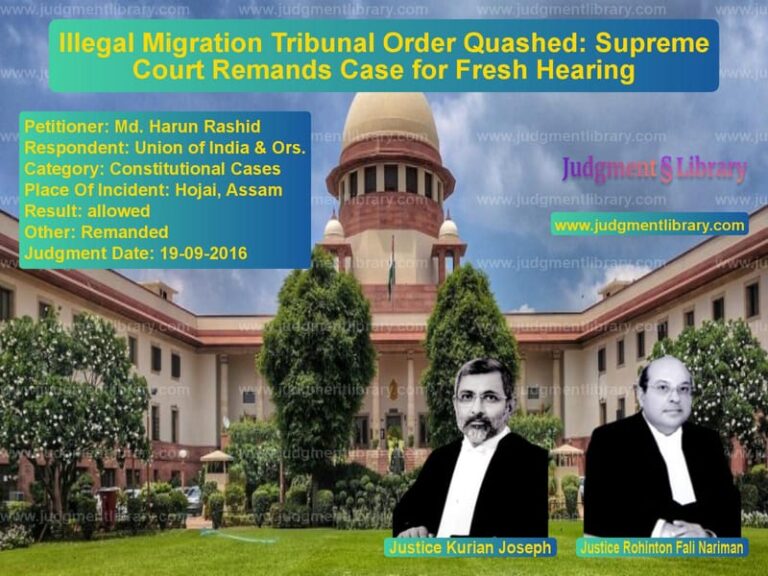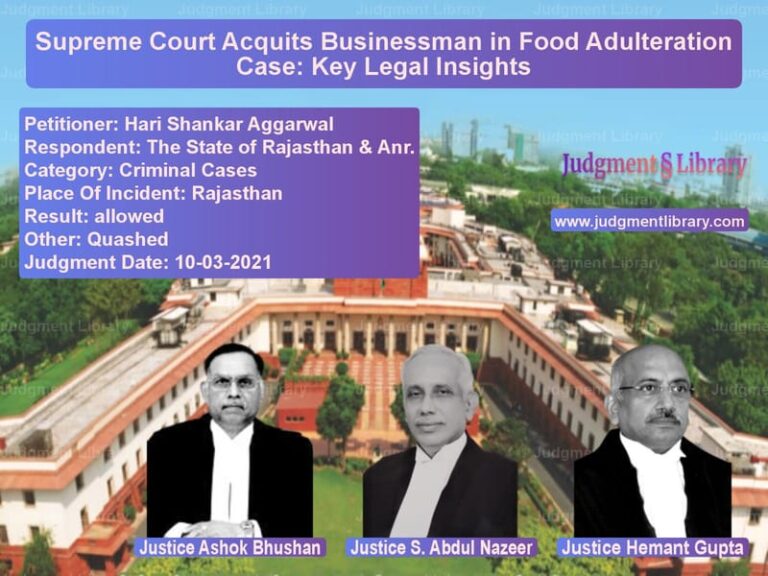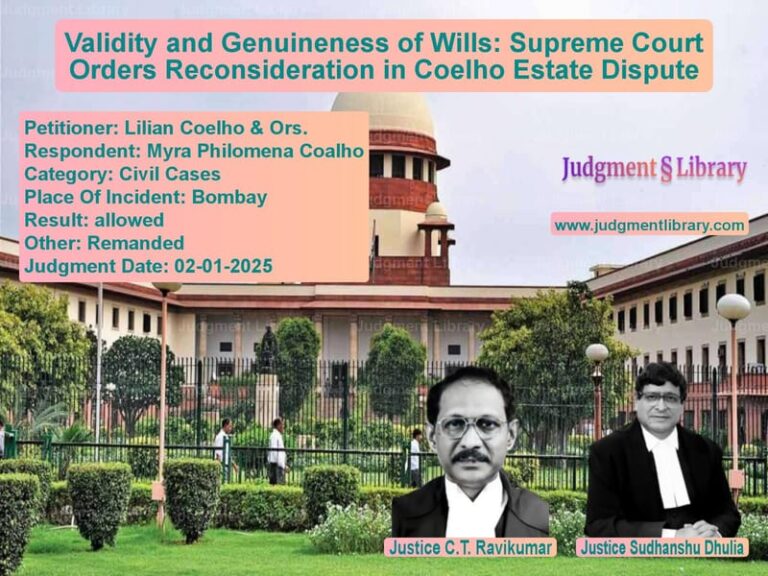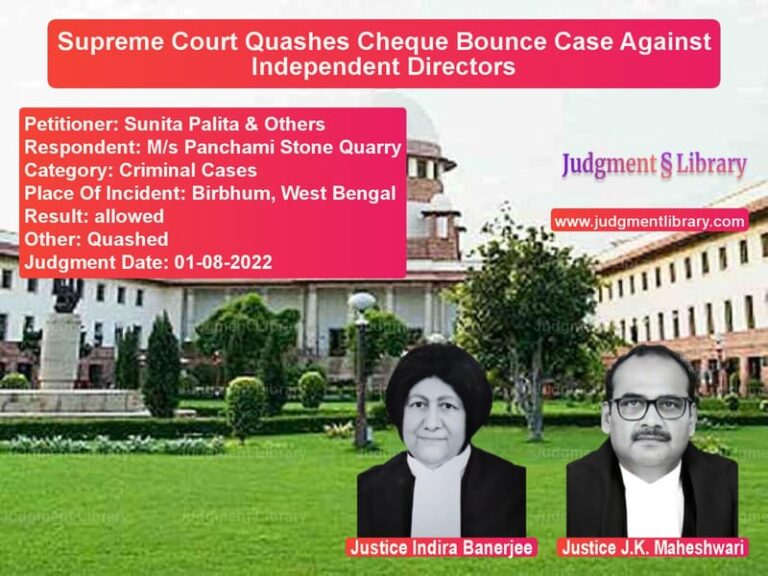Land Dispute Between Ranchi University and Jharkhand Housing Board: Supreme Court Verdict
The Supreme Court of India, in its landmark judgment in The Vice Chancellor, Ranchi University & Ors. vs. Jharkhand State Housing Board & Ors., delivered on October 23, 2018, resolved a long-standing dispute between Ranchi University and the Jharkhand State Housing Board over the ownership and possession of residential flats meant for university employees. The case highlights crucial legal principles regarding property ownership, tenant rights, and unauthorized occupation of public premises.
Background of the Case
The dispute originated in 1976 when the Jharkhand State Housing Board (hereinafter referred to as “the Board”) allotted 192 flats to Ranchi University for the accommodation of its employees under an agreement that required payment in installments. The University made an initial payment of 10% of the total amount and continued paying the monthly installments regularly until 1991. However, defaults occurred in subsequent years.
Despite the partial payments, the University took possession of the flats and allotted them to its employees. Some flats were later converted into hostels. Meanwhile, the Board raised a demand for Rs. 2,62,44,149, which included outstanding installments and interest on unpaid amounts. Due to non-payment, the Board canceled the allotment in 1992 and attempted to reallocate the flats to certain employees.
The dispute escalated when retired employees, who had occupied the flats for years, sought ownership rights by depositing money directly with the Board. The University opposed this and sought to reclaim possession.
Arguments by the Petitioner (Ranchi University)
- The University contended that the flats were legally allotted to it and were not available for direct sale to the employees.
- It had made substantial payments towards the total consideration, and further payments were pending from the state government.
- Employees who had retired had no legal right to continue occupying the flats.
- Any direct transaction between the employees and the Board was unauthorized and against the University’s interests.
Arguments by the Respondent (Jharkhand State Housing Board & Employees)
- The Board asserted that since the University had defaulted in payments, it had the right to cancel the allotment.
- The employees argued that they had deposited money with the Board in good faith, and ownership should be transferred to them.
- The employees claimed that their long tenure in the flats gave them a vested interest in the property.
High Court’s Ruling
The High Court had ruled in favor of the employees, directing the Board to execute lease deeds in their favor based on current terms and mutual agreement.
Supreme Court’s Analysis and Judgment
The Supreme Court, after reviewing the facts and legal submissions, overturned the High Court’s decision and ruled in favor of Ranchi University.
Key Observations of the Court
- The original allotment was made in favor of the University, and any direct transaction between employees and the Board was invalid.
- Employees were in unauthorized occupation of the flats once their employment ended.
- The University had the right to evict unauthorized occupants under the Public Premises (Eviction of Unauthorized Occupants) Act, 1971.
- The High Court erred in directing the Board to execute lease deeds in favor of the occupants without considering the University’s legal ownership.
Final Ruling
- The Supreme Court set aside the High Court’s ruling and restored the order of the Single Judge, which had dismissed the employees’ writ petitions.
- It upheld the University’s right to seek eviction proceedings against unauthorized occupants.
- The Board was directed to refund any money paid by employees for direct allotment.
- The University was encouraged to resolve its pending financial obligations regarding the flats with the assistance of the state government.
Impact of the Judgment
The ruling has significant implications for property disputes involving government institutions and housing boards:
- Reaffirms that employees do not gain ownership rights over government-allotted housing.
- Establishes that lease agreements and allotments must be strictly followed.
- Highlights the importance of maintaining proper financial compliance in property agreements.
Conclusion
The Supreme Court’s decision in The Vice Chancellor, Ranchi University & Ors. vs. Jharkhand State Housing Board & Ors. reinforces the principle that unauthorized occupants cannot claim ownership of government-allocated properties. The ruling ensures that public institutions retain control over their allotted properties and that legal processes are followed in eviction and property disputes.
Petitioner Name: The Vice Chancellor, Ranchi University & Ors..Respondent Name: Jharkhand State Housing Board & Ors..Judgment By: Justice Abhay Manohar Sapre, Justice Indu Malhotra.Place Of Incident: Ranchi, Jharkhand.Judgment Date: 23-10-2018.
Don’t miss out on the full details! Download the complete judgment in PDF format below and gain valuable insights instantly!
Download Judgment: The Vice Chancellor, vs Jharkhand State Hous Supreme Court of India Judgment Dated 23-10-2018.pdf
Direct Downlaod Judgment: Direct downlaod this Judgment
See all petitions in Property Disputes
See all petitions in Landlord-Tenant Disputes
See all petitions in Specific Performance
See all petitions in Judgment by Abhay Manohar Sapre
See all petitions in Judgment by Indu Malhotra
See all petitions in allowed
See all petitions in Remanded
See all petitions in supreme court of India judgments October 2018
See all petitions in 2018 judgments
See all posts in Civil Cases Category
See all allowed petitions in Civil Cases Category
See all Dismissed petitions in Civil Cases Category
See all partially allowed petitions in Civil Cases Category






